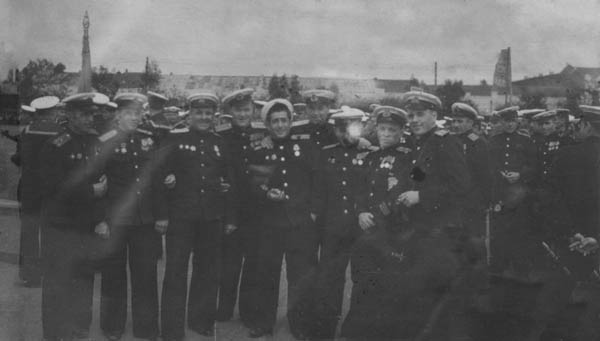 May 9, 1945
May 9, 1945
|
interview by Oleg Korytov [email protected] (remove .nospam) |
|
|
|
|
 May 9, 1945
May 9, 1945
Q: If I remember correctly you said that you used some not very usual
method of bomb aiming?
A: Yes. You see, the problem in MBR-2 was that usual, standard aiming
device, the OBP-1 was designed to aim from 2000 m only. No higher or lower.
what we did – we would draw differently coloured lines in the side of the
cabin and aim with an MG. it was extremely precise method, and we did not
have to fiddle with the alt change charts, what in turn seriousely shortened
attack time. Catalinas had good, precise, but mechanically complex and
unreliable sight.
Q: What was common bomb load?
A: 1 FAB-100, 3 PLAB-100 10, 30, 60m fuses. A hit within 10-15m was
a shure kill due to hydraulic impact, especially at depth.
Q: If You were at sea and You would find a ship, how you would confirm
if it was enemy?
A: well, no ship would be at sea only because captain wants it to be
there. We received possible areas of our fleet positions for the duration
of flight. Enemy ships would reveal themselvesf very soon, as it would
throw everything at you on approach. The ship we sunk by MG fire was depleted
of ammo, and that was the only reason we got close enough to shoot. 2-3
times a year we would loose one of our planes to surface friendly-fire.
In July 1941 we lost one from two-plane flight to the patrol boat. We gathered
our selves, and went to that ship, beat the gunners and threw them overboard.
But stuff like that happened.
Q: Was defence good enough?
A: Well, we could cover all upper hemisphere in both planes, but lower
part was undefended, of course. Seriouselly speaking, one of my colleagues
managed to shoot down 2 me-109 with ShKAS. My gun had special stoppers
made for not shooting through engine.
Q: Meeting enemy planes was not really common thing?
A: meeting a fighter would usually end up in being shot down. No surprise
really. But usually we would meet Do-18, 24 or 4-engined FW-200 patrollers.
But usually we would gallantly fly by our business, not forgetting to notify
our fighter regiments. It was not our business to deal with them. Though,
I remember that neighbouring regiments pilot flew under such boat and gunner
shot its belly seriouselly. Most likely it sunk after landing.
Q: What would happen if You would have a damaged belly?
A: on landing we would have full fuselage of water, so that th plane
will gradually sunk. If the side floats would be damaged, we wouldn’t even
have time to get out. On the initial run we would loose some skin bits.
Q: was it difficult to land these planes?
A: Oh, yes. On take off most difficult part was the wild ducks… There
were lots of ‘em, and at take off speed about 150 km\h duck would do same
damage as 20mm explosive shell. Landing on 3 ball sea was considered as
dangerous, and 3,5 impossible. Surprisingly, most planes were lost on still
water (pilots couldn’t see where the water level was), so that we had speed
boats going cross our landing approach to create waves. If we would land
on to the log under water the plane would disintegrate, and they are only
visible in wavy conditions…
Q: Do You remember Your last combat sortie?
A: September 1945. Don’t be surprised, we kept flying convoy cover
until 1946. The point was that we could see the mines under water surface
and warn ships. Even now once in a 3-4 years ships would be damaged by
those mines… So our presence was needed. I ended war with 380+ missions.
Q: Do you remember the war end?
A: Yes, of course! I was asleep, when firing started near my house,
I grabbed my machine pistole, and ran to the street. Everybody were shooting
upwards, I asked what happened, someone shouted “ war finished, we WON!”
and I started shooting my self. For 2 days we were drunk, but after that
peace time service begun with discipline and all other stuff included.
Q: and after the war?
A: My life was not too happy after the war… I had to leave flying for
teaching in Military Navy Academy in Leningrad, my son was first assistant
at the “Komsomolets” sub and died on 7 of april 1989, when it sunk near
Medvezhiy island… War was clear and easy… and life is DIFFICULT. But war
is so stupid, it should not ever happen again. I do not understand what
happens nowadays, why so many wars are going on? Or may be Stalin was right,
saying that one man death is a tragedy, but death of millions is a statistics?
|
|
|
|